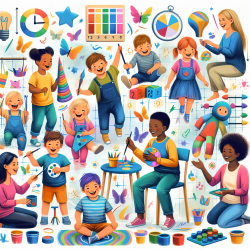Introduction
In the realm of speech-language pathology, the power of shared reading is a well-documented catalyst for language and literacy development in young children. A recent study titled A Qualitative Assessment of Community Acceptability and Use of a Locally Developed Children’s Book to Increase Shared Reading and Parent-Child Interactions in Rural Zambia sheds light on how culturally relevant materials can enhance these outcomes. This blog explores the findings of this study and offers insights for practitioners eager to improve their skills and outcomes for children.
Key Findings from the Research
The study conducted in rural Zambia assessed the acceptability and use of a locally developed children's book. The research highlighted several key findings:
- Wide Acceptability: The children's book was well-received across communities, appreciated for its cultural relevance and engaging folktale structure.
- Enhanced Interactions: The book facilitated various forms of caregiver-child interactions, including one-on-one and group reading sessions.
- Vocabulary Development: Caregivers reported that the book helped children expand their vocabulary and early literacy skills.
- Support for Low Literacy Caregivers: The simple vocabulary and engaging pictures made the book accessible even to caregivers with lower literacy levels.
Implications for Practitioners
For speech-language pathologists and educators, these findings underscore the importance of culturally relevant materials in early literacy interventions. Here are some practical steps practitioners can take:
- Incorporate Culturally Relevant Materials: Select books and materials that reflect the cultural backgrounds of the children you work with. This fosters a deeper connection and engagement.
- Facilitate Shared Reading: Encourage caregivers to engage in shared reading activities. Provide guidance on how to make these sessions interactive, such as asking questions about the story or pictures.
- Support Low Literacy Caregivers: Offer workshops or resources that empower caregivers with lower literacy skills to effectively use books as tools for interaction and learning.
- Advocate for Book Distribution Programs: Support initiatives that provide access to age-appropriate and culturally relevant books in underserved communities.
Encouraging Further Research
While the study provides valuable insights, it also highlights areas for further research. Practitioners and researchers should consider exploring:
- The long-term impact of culturally relevant books on literacy and language development.
- Strategies to enhance the effectiveness of shared reading in diverse cultural contexts.
- The role of digital tools and platforms in expanding access to culturally relevant materials.
To read the original research paper, please follow this link: A Qualitative Assessment of Community Acceptability and Use of a Locally Developed Children’s Book to Increase Shared Reading and Parent-Child Interactions in Rural Zambia.










